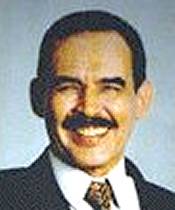
The first fully democratic Presidential election since 1960 occurred on 11 March 2007. The election was the final transfer from military to civilian rule following the military coup in 2005. This was the first time the president was selected by ballot in the country's history. The election was won by Sidi Ould Cheikh Abdallahi, who was ousted by a military coup in 2008 and replaced by general Mohamed Ould Abdel Aziz.
The Movement for Democratic Renewal and Development, is a political party in Djibouti. It was originally known as the Party for Democratic Renewal. The PRD of Djibouti was created with the purpose of forming a national democratic party. The PRD gained popularity at the collapse of the communist bloc and the end of the Cold War. It used its military power gained through its coalition with the Front for the Restoration of Unity and Democracy (FRUD) and the Movement for Peace and Reconciliation (MPR). The current leader of PRD is Abdillani Hamariteha.

Prior to the coup d'état of August 2005, Mauritania was a one party dominant state with the Democratic and Social Republican Party in power. Opposition parties were allowed, but widely considered to have no real chance of gaining power.

Elections in Benin take place within the framework of a multi-party democracy and a presidential system. Both the President and the National Assembly are directly elected by voters, with elections organised by the Autonomous National Electoral Commission (CENA).

The Rally of Democratic Forces, or Assembly of Democratic Forces, is a political party in Mauritania. It is led by Ahmed Ould Daddah.

The Union of the Forces of Progress is a left leaning political party in Mauritania.
Sidi Mohamed Ould Boubacar was Prime Minister of Mauritania from 1992 to 1996 and again from 2005 to 2007.
The Democratic Renewal Party is a political party of Benin led by Adrien Houngbédji. Houngbédji lived in exile for several years, but returned to Benin to take part in the National Conference of 1990. He built up his party largely around other exiled Beninese. PRD was legally recognized on September 24, 1990.

Legislative elections were held in the Republic of Dahomey on 2 April 1959. Although the Dahomeyan Democratic Union (UDD) received the most votes, they won the fewest seats. The Republican Party of Dahomey (PRD), which came second in terms of votes, won 37 of the 70 seats in the Legislative Assembly. Following the election the PRD and UDD agreed to split the seats in one constituency, with the PRD losing nine seats and the UDD gaining nine seats.
Adrien Houngbédji is a Beninese politician and the leader of the Democratic Renewal Party, one of Benin's main political parties. He was President of the National Assembly of Benin from 1991 to 1995, Prime Minister of Benin from 1996 to 1998, and President of the National Assembly again from 1999 to 2003. Beginning in 1991, he stood repeatedly as a presidential candidate; he placed second in 2006, but was heavily defeated by Yayi Boni in a second round of voting. Since 2015, he has served for a third time as President of the National Assembly.

The unicameral National Assembly is the legislative body of the Republic of Cape Verde.

A Mauritanian presidential election occurred on 11 March 2007. Since no candidate received a majority of the votes, a second round was held on 25 March between the top two candidates, Sidi Ould Cheikh Abdallahi and Ahmed Ould Daddah. Abdallahi won the second round with about 53% of the vote and took office in April.

Parliamentary and municipal elections in Mauritania occurred on 19 November and 3 December 2006. At least 28 political parties competed to comprise the lower house of parliament, the National Assembly; Islamist parties were banned, but many Islamists ran as independent candidates. 95 seats in the National Assembly were at stake in the election, along with over 200 local councils.
Ahmed Ould Daddah is a Mauritanian economist, politician and civil servant. He is a half-brother of Moktar Ould Daddah, the first President of Mauritania, and belongs to the Marabout Ouled Birri tribe. He is currently the President of the Rally of Democratic Forces (RFD) and was designated as the official leader of the opposition following the 2007 presidential election, in which he placed second.
The People's Progressive Alliance is a political party in Mauritania.

Parliamentary elections were held in Mauritania on 6 March 1992, with a second round on 13 March. They were the first National Assembly elections after the constitutional referendum the previous year that resulted in the reintroduction of multi-party democracy. The result was a victory for the ruling Democratic and Social Republican Party, which won 67 of the 79 seats in the Assembly. Voter turnout was just 38.9%.

Parliamentary elections were held in Mauritania on 23 November. The opposition has vowed to boycott the election unless the president steps down beforehand. A total of 1,096 candidates have registered to compete for the leadership of 218 local councils across Mauritania, whilst 438 candidates are contesting for the 146 parliamentary seats. Some 1.2 million Mauritanians were eligible to vote in the election. The first round results yielded a landslide victory for the ruling UPR winning 56 seats and their 14 coalition partners winning 34 seats. The Islamist Tewassoul party won 12 seats. The remaining seats were contested in a runoff on 21 December 2013. The UPR won the majority with 75 seats in the Assembly.

The Dahomeyan Democratic Union was a political party in French Dahomey.










